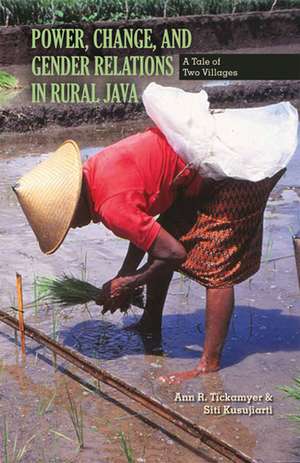Power, Change, and Gender Relations in Rural Java: A Tale of Two Villages: Ohio RIS Southeast Asia Series, cartea 125
Autor Ann R. Tickamyer, Siti Kusujiartien Limba Engleză Paperback – 15 ian 2012
Women’s status in rural Java can appear contradictory to those both inside and outside the culture. In some ways, women have high status and broad access to resources, but other situations suggest that Javanese women lack real power and autonomy. Javanese women have major responsibilities in supporting their families and controlling household finances. They may also own and manage their own property. Yet these symbols and potential sources of independence and influence are determined by a culturally prescribed, state-reinforced, patriarchal gender ideology that limits women’s autonomy. Power, Change, and Gender Relations in Rural Java examines this contradiction as well as sources of stability and change in contemporary Javanese gender relations.
The authors conducted their research in two rural villages in Yogyakarta, Indonesia, during three important historical and political periods: the end of the New Order regime; the transitional period of reformation; and the subsequent establishment of a democratic government. Their collaboration brings a unique perspective, analyzing how gender is constructed and reproduced and how power is exercised as Indonesia faces the challenges of building a new social order.
The authors conducted their research in two rural villages in Yogyakarta, Indonesia, during three important historical and political periods: the end of the New Order regime; the transitional period of reformation; and the subsequent establishment of a democratic government. Their collaboration brings a unique perspective, analyzing how gender is constructed and reproduced and how power is exercised as Indonesia faces the challenges of building a new social order.
Din seria Ohio RIS Southeast Asia Series
-
 Preț: 259.31 lei
Preț: 259.31 lei -
 Preț: 268.56 lei
Preț: 268.56 lei -
 Preț: 295.55 lei
Preț: 295.55 lei -
 Preț: 440.63 lei
Preț: 440.63 lei -
 Preț: 293.22 lei
Preț: 293.22 lei -
 Preț: 236.19 lei
Preț: 236.19 lei -
 Preț: 227.12 lei
Preț: 227.12 lei -
 Preț: 275.22 lei
Preț: 275.22 lei -
 Preț: 354.83 lei
Preț: 354.83 lei -
 Preț: 269.44 lei
Preț: 269.44 lei -
 Preț: 260.45 lei
Preț: 260.45 lei -
 Preț: 235.78 lei
Preț: 235.78 lei -
 Preț: 254.68 lei
Preț: 254.68 lei -
 Preț: 295.09 lei
Preț: 295.09 lei -
 Preț: 207.34 lei
Preț: 207.34 lei -
 Preț: 272.32 lei
Preț: 272.32 lei -
 Preț: 131.60 lei
Preț: 131.60 lei -
 Preț: 293.81 lei
Preț: 293.81 lei -
 Preț: 228.65 lei
Preț: 228.65 lei -
 Preț: 229.03 lei
Preț: 229.03 lei -
 Preț: 209.43 lei
Preț: 209.43 lei - 6%
 Preț: 203.85 lei
Preț: 203.85 lei -
 Preț: 260.45 lei
Preț: 260.45 lei -
 Preț: 282.63 lei
Preț: 282.63 lei -
 Preț: 242.35 lei
Preț: 242.35 lei -
 Preț: 285.81 lei
Preț: 285.81 lei -
 Preț: 260.45 lei
Preț: 260.45 lei - 7%
 Preț: 187.76 lei
Preț: 187.76 lei - 12%
 Preț: 190.70 lei
Preț: 190.70 lei
Preț: 254.68 lei
Nou
Puncte Express: 382
Preț estimativ în valută:
48.74€ • 50.70$ • 40.24£
48.74€ • 50.70$ • 40.24£
Carte tipărită la comandă
Livrare economică 14-28 aprilie
Preluare comenzi: 021 569.72.76
Specificații
ISBN-13: 9780896802841
ISBN-10: 0896802841
Pagini: 246
Dimensiuni: 140 x 216 x 28 mm
Greutate: 0.27 kg
Ediția:1
Editura: Ohio University Press
Colecția Ohio University Press
Seria Ohio RIS Southeast Asia Series
ISBN-10: 0896802841
Pagini: 246
Dimensiuni: 140 x 216 x 28 mm
Greutate: 0.27 kg
Ediția:1
Editura: Ohio University Press
Colecția Ohio University Press
Seria Ohio RIS Southeast Asia Series
Recenzii
“(Tickamyer and Kusujiarti) provide a captivating insider/outsider perspective on everyday life and social change in two Central Javanese villages. Based on quantitative and qualitative fieldwork from the mid-1990s up till 2010, their book should become the essential source for understanding gender in rural Java.”—Inside Indonesia
“Power, Change, and Gender Relations in Rural Java is an important book in the area of gender and development. It provides thoughtful insight into how women in various developing countries are involved in contradictory gender roles and how this ‘contradiction is endured, reproduced, and perpetuated.’ As an important scholarly contribution, it will be useful for graduate and advanced undergraduate courses in gender, development, and social change.”—Rural Sociology
“By conducting semi-structured interviews in the same villages and with many of the same individuals for more than 20 years, the authors have rich and varied data that are analyzed and presented in a variety of ways in order to characterize and probe perceptions and experiences of gender…. The historical and analytical detail provided in this book will be of particular interest to scholars of southeast Asian social and political changes, as the authors paint a dynamic picture of the myriad influences on gender ideas and roles in Java and Indonesia.” —Contemporary Sociology
Notă biografică
Ann R. Tickamyer is a professor of rural sociology and head of the Department of Agricultural Economics and Rural Sociology at Pennsylvania State University. She is the coeditor of Communities of Work: Rural Restructuring in Local and Global Contexts, also from Ohio University Press.
Siti Kusujiarti is a professor of sociology and chair of the Department of Sociology and Anthropology, Warren Wilson College, Asheville, North Carolina. She is the author of numerous publications on rural poverty, inequality, gender, work, and development.
Siti Kusujiarti is a professor of sociology and chair of the Department of Sociology and Anthropology, Warren Wilson College, Asheville, North Carolina. She is the author of numerous publications on rural poverty, inequality, gender, work, and development.
Descriere
Women’s status in rural Java can appear contradictory to those both inside and outside the culture. In some ways, women have high status and broad access to resources, but other situations suggest that Javanese women lack real power and autonomy.

















